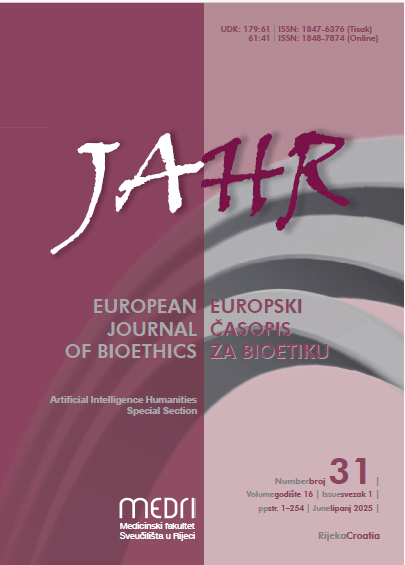Homo absconditus u duhu filozofske prakse
Keywords:
Homo absconditus, filozofska praksa, psiho-sinteza, Berdjajev.Abstract
https://doi.org/10.21860/j.16.1.11
„Čovjek više treba psiho-sintezu nego psiho-analizu”, piše ruski filozof Nikolaj Berdjajev, na čijem tragu ovaj rad želi istražiti sakrivenog čovjeka, u vidu psiho-sinteze koju može ponuditi filozofska praksa, jer čovjek je prema istom filozofu „zagonetka u ovom svijetu, možebitno i najveća zagonetka”. Odgonetanje te zagonetke, tog Homo absconditusa objelodanit će čovjeka drugačijeg od onog kojem je potrebna psihoterapija, kao oblik njege njegove duševne sastavine da se nosi s društvom, društveno-socijalnim, društveno-tehničko-ustrojstvenim stvarnostima vlastite neposredne realnosti. U duhu dobre filozofske prakse, usmjerene na liječenje čovjeka pod vidom psiho-sinteze mora se skrenuti pozornost na lučenje onoga sakrivenog u čovjeku, onoga što postoji pod maskom njegove društvene persone kao „stvaran čovjek”, a koji je u vidu psihoanalize „sjena” ili sakriveni, onaj do kojeg se mora doprijeti kako bi se uopće pristupilo putu njegova izlječenja.
Downloads
Published
Issue
Section
License
Authors who publish with this journal agree to the following terms:
- Authors retain copyright and grant the journal right of first publication with the work simultaneously licensed under a Creative Commons Attribution License that allows others to share the work with an acknowledgement of the work's authorship and initial publication in this journal.
- Authors are able to enter into separate, additional contractual arrangements for the non-exclusive distribution of the journal's published version of the work (e.g., post it to an institutional repository or publish it in a book), with an acknowledgement of its initial publication in this journal.
- Authors are permitted and encouraged to post their work online (e.g., in institutional repositories or on their website) prior to and during the submission process, as it can lead to productive exchanges, as well as earlier and greater citation of published work (See The Effect of Open Access).



